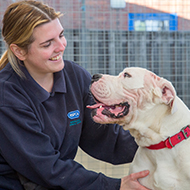
After four surgeries, Sam can finally see.
An American bulldog has undergone 'facelift' surgery to help his sight and make him more comfortable.
Six-year-old Sam, who had gone through three surgeries prior to this to help him see, was given a full facelift, with large amounts of skin removed from around his eyes and head.
Sam's journey began when he was rescued by the RSPCA in February 2021, after being discovered living in a plastic container with severe eye issues.
The veterinary team at Great Ayton Animal Centre in North Yorkshire took Sam in, and Emma Cosby, who is part of the team at the centre, explained: “Sam’s eyes were really bad due to bilateral upper and lower entropion. This is a painful condition where the eyelid turns inwards and rubs on the eye.
“Sam’s eyes were very irritated and he had lots of discharge. Our vets operated right away to correct the problem but, sadly, a few months later, he needed further surgery as the sutures that had been used to correct the eyelids were not dissolving properly.
Two further surgeries were required, with Sam needing some of his skin folds removed – however,
his eyes continued to bother him, so in February 2022, veterinary surgeons at Great Ayton performed a full facelift procedure on him.
“Large amounts of skin were removed from his face until his eyelids sat comfortably and a facial fold resection was performed,” said Emma.
“Eventually he recovered from the surgery and the cultures were removed and, finally, Sam can see without irritation.”
Thanks to the procedure, Sam is now able to live a more comfortable life, his surgeries have left him with scarring on his right eye, and a sensitivity to sunlight, which is something his new owners will have to consider in their care for him.
Following his four surgeries, and 14 months under the care of the RSPCA, Sam is now ready to be adopted, and experience the care of a loving home.
Image (C) RSPCA



 The Veterinary Medicines Directorate (VMD) is inviting applications from veterinary students to attend a one-week extramural studies (EMS) placement in July 2026.
The Veterinary Medicines Directorate (VMD) is inviting applications from veterinary students to attend a one-week extramural studies (EMS) placement in July 2026.